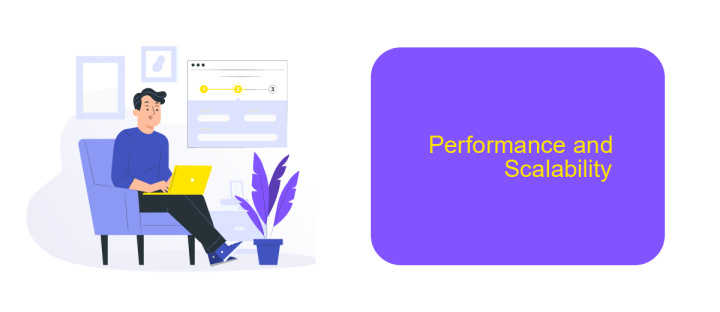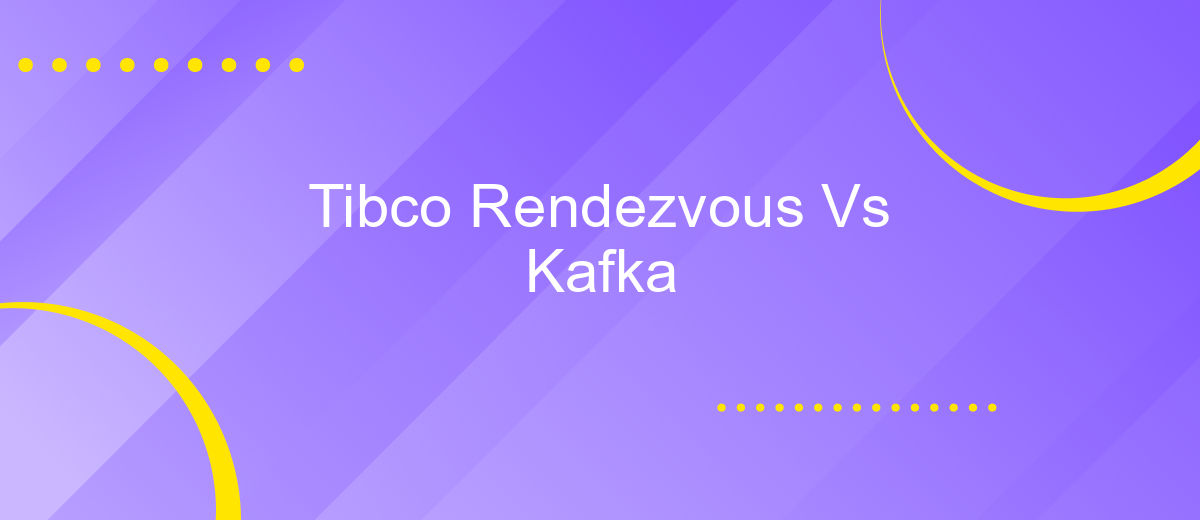Tibco Rendezvous Vs Kafka
When it comes to enterprise messaging systems, Tibco Rendezvous and Apache Kafka are two prominent contenders. Each offers unique features and capabilities tailored to different use cases. This article aims to provide a comparative analysis of Tibco Rendezvous and Kafka, highlighting their strengths, weaknesses, and ideal applications to help organizations make an informed decision.
Introduction
In the rapidly evolving landscape of data integration and real-time messaging, choosing the right tool for your organization's needs can be a daunting task. Tibco Rendezvous and Apache Kafka are two prominent solutions that offer robust capabilities for messaging and data streaming, each with its own strengths and use cases. Understanding the key differences and benefits of these platforms is crucial for making an informed decision.
- Tibco Rendezvous: Known for its reliable messaging and low-latency communication, ideal for financial and trading systems.
- Apache Kafka: Renowned for its high throughput and scalability, commonly used for big data and real-time analytics.
Additionally, integrating these systems with other applications can be streamlined using tools like ApiX-Drive, which simplifies the process of connecting various services and automating workflows. By leveraging such integration platforms, businesses can enhance their operational efficiency and ensure seamless data flow across their technology stack.
Messaging Model

Tibco Rendezvous and Kafka employ different messaging models to facilitate communication between distributed systems. Tibco Rendezvous uses a subject-based messaging model, where messages are published to specific subjects and subscribers receive messages based on the subjects they are interested in. This model allows for flexible and dynamic message routing, making it suitable for applications requiring real-time data distribution and low-latency communication.
Kafka, on the other hand, uses a topic-based messaging model with a focus on high-throughput and fault tolerance. Messages are published to topics, and consumers subscribe to these topics to receive messages. Kafka's partitioning and replication mechanisms ensure scalability and reliability, making it ideal for handling large volumes of data and stream processing. For those looking to integrate Tibco Rendezvous or Kafka with other systems, services like ApiX-Drive can simplify the process by offering seamless integration capabilities, reducing the complexity of setting up and managing data flows between different platforms.
Features and Capabilities

Tibco Rendezvous and Kafka are both robust messaging platforms, but they offer distinct features and capabilities suited for different use cases. Tibco Rendezvous is known for its high-performance messaging and real-time data distribution, while Kafka excels in handling large-scale data streams and event sourcing.
- Scalability: Kafka is designed for horizontal scalability, making it ideal for big data applications. Tibco Rendezvous, on the other hand, is optimized for low-latency, high-throughput messaging.
- Integration: Tibco Rendezvous offers seamless integration with other Tibco products, whereas Kafka integrates well with a wide range of third-party tools, including ApiX-Drive, which simplifies the setup of data pipelines and integrations.
- Durability: Kafka provides high durability through its distributed log architecture, ensuring data persistence. Tibco Rendezvous focuses more on real-time message delivery with lesser emphasis on long-term storage.
In summary, Tibco Rendezvous is ideal for scenarios requiring real-time, low-latency messaging, while Kafka is better suited for applications needing scalable, durable data streaming solutions. The choice between the two depends on the specific requirements of your project, including integration needs, where tools like ApiX-Drive can play a crucial role in simplifying the process.
Performance and Scalability

When comparing Tibco Rendezvous and Kafka, performance and scalability are crucial factors to consider. Tibco Rendezvous is known for its low-latency messaging, making it suitable for real-time applications. However, its performance can be impacted by network congestion and the complexity of the messaging patterns.
On the other hand, Kafka excels in handling high-throughput data streams with minimal latency. It is designed to scale horizontally, allowing for the addition of more brokers to handle increased loads without significant performance degradation. Kafka's partitioning and replication mechanisms ensure data availability and fault tolerance, which are essential for large-scale distributed systems.
- Latency: Tibco Rendezvous offers lower latency for real-time messaging, while Kafka provides slightly higher latency but better throughput.
- Scalability: Kafka scales horizontally by adding more brokers, whereas Tibco Rendezvous may require more complex configurations to scale.
- Throughput: Kafka handles high-throughput data streams efficiently, making it ideal for big data applications.
- Fault Tolerance: Kafka's replication ensures data availability, while Tibco Rendezvous relies on network stability.
For organizations looking to integrate these messaging systems seamlessly, services like ApiX-Drive can simplify the process. ApiX-Drive offers easy-to-use tools for connecting various applications and automating workflows, ensuring smooth data flow between Tibco Rendezvous, Kafka, and other systems.
Use Cases and Applications
Tibco Rendezvous is widely used in financial services, telecommunications, and other industries requiring high-performance messaging systems. Its primary use cases include real-time data distribution, market data dissemination, and application integration within complex enterprise environments. Tibco Rendezvous excels in scenarios where low latency and high throughput are critical, such as trading platforms and network management systems. Its reliability and robustness make it suitable for mission-critical applications that demand consistent and predictable performance.
Kafka, on the other hand, is commonly employed in big data analytics, log aggregation, and stream processing. It is an essential component in modern data pipelines, enabling the collection, storage, and processing of large volumes of data in real-time. Kafka's ability to handle high-throughput and fault-tolerant messaging makes it ideal for use cases like monitoring, event sourcing, and integrating with microservices architectures. For businesses looking to streamline their integration processes, services like ApiX-Drive can facilitate seamless connectivity between Kafka and various applications, enhancing data flow and operational efficiency.


FAQ
What are the primary differences between Tibco Rendezvous and Kafka?
Can Tibco Rendezvous and Kafka be used together in the same ecosystem?
Which platform is better suited for real-time analytics?
How does message durability compare between Tibco Rendezvous and Kafka?
What tools can help with the integration and automation of Tibco Rendezvous and Kafka?
Strive to take your business to the next level, achieve your goals faster and more efficiently? Apix-Drive is your reliable assistant for these tasks. An online service and application connector will help you automate key business processes and get rid of the routine. You and your employees will free up time for important core tasks. Try Apix-Drive features for free to see the effectiveness of the online connector for yourself.

